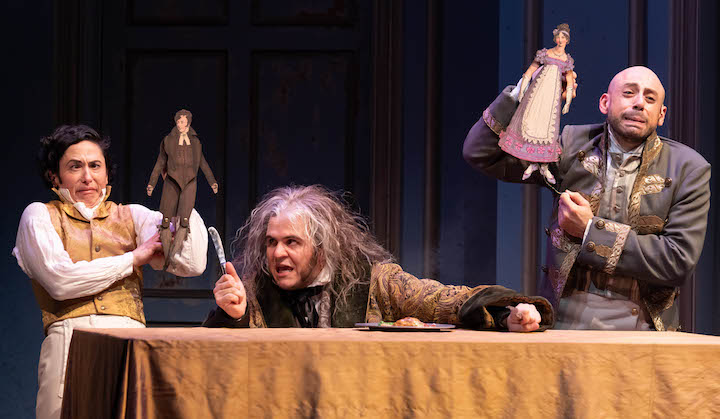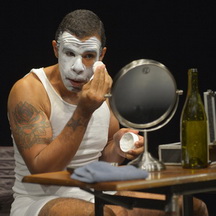As the top-hatted Manager assures us from the stage setting of Vanity Fair: there are no morals here. But that’s a good thing, for as most of us have discovered, morals are not a lot of fun. And if there is one thing the A.C.T. production of Thackeray’s classic satire is, it’s fun. Delightfully, wackily, preposterously fun. Much more so than the darker, more biting original.
The humor starts with the playwright’s witty handling of the book. The original was set in 19th-century England, and Thackeray’s novel aims to comment on the iniquities of English society, its social snobbery, its craven love of money and the power it brings, and the limitations placed on women. The very complex plot that follows the many characters of the book is ably distilled by playwright Kate Hamill, who seems to have a knack for the early 19th century of English and American classics. She has adapted Jane Austen’s Mansfield Park and Pride and Prejudice, as wells as Alcott’s Little Women, with an anachronous jaunt into classical times with The Odyssey. With Vanity Fair she succeeds admirably in her “aim to blend in new dialog so seamlessly that you can’t tell what’s Thackeray and what’s me.” And even more importantly, to craft a play that is wholly understandable and enjoyable to a contemporary audience.

Director Jessica Stone aids in the recreation by holding the superlative cast to a highly stylized form of movement. It’s all choreographed, at times lapsing into a silent film stop-action dance of exaggerated action. Consider the dinner at the Sedley’s house, when the diners raise their napkins in the air in a coordinated salute, Becky drops (flings) her napkin to the floor, assumes a horrified expression, turns to Jos, the doltish young heir, with a pleading look, grips his arm, drops her head on her hand on his arm. It’s a wildly absurd bit of direction, imitating the poses of silent-film melodrama and celebrating (while poking fun at) a madly outdated femininity. Sadly, lumpish Jos responds not. And the whole choreography is repeated. And repeated. Throughout the play the direction wavers between the comic and the absurd, twisting the darkness of Thackeray’s crueler satire into a light, fast-moving romp. A shedding, which allows the audience a reprieve from whatever social and cultural amorality plagues our own 21st century lives.
And the actors clearly enjoy the challenge. Rebekah Brockman is the ambitious young Becky Sharp, who wants “everything” and sadly is born with almost nothing in a society where there is no level playing field, and the very concept of one is despised. To the role Brockman adds vivacity and a rather good-natured calculation. Maribel Martinez plays Amelia Sedley, Becky Sharp’s beloved foil, a proper middle-class young lady with the personality of cotton candy. Martinez gives the character substance and allure.

The other actors have the enviable duty of playing multiple characters. And they are all brilliant. But I admit to a greater admiration of Dan Hiatt, who opens the play like an elegant barker as the Master, framing what we are about to see as the Vanity Fair of life, with its sins and excesses. Later, he appears as the difficult Miss Crawley, matriarch, who typifies the snobbery of the day and adores Becky in her role of governess but is infuriated when Becky marries Miss Crawley’s favorite nephew, casting aside the class conventions that make up the backbone of Miss Crawley and her ilk. Alyssa Keegan, Anthony Lopez, Adam Magill and Vincent Randazzo all play multiple parts, cross-gendered and swaggering, with Saturday Night Live abandon.
Other characters are played by stick puppets (there are after all heaps of characters in this saga) and life-size cardboard illustrations. It’s a clever adaptation and reference to Thackeray’s novel, which starts out with the Master introducing a puppet play: “The famous little Becky Puppet has been pronounced to be uncommonly flexible in the joints, and lively on the wire.” Besides the sets that make a theater within the theater, scenes are also created using the 18th-century device of the panorama, a scene painted on a canvas that was changed by rolling and unrolling the canvas to reveal different scenes. These interweave with the three-dimensional sets that are currently conventional. The three levels of stage sets, designed by Alexander Dodge, add to the vigor and motion of the play. Lighting by David Weiner. Costumes by Jennifer Moeller.
Vanity Fair is a terrific and imaginative production.
– Jaime Robles
Kate Hamill’s adaptation of Thackeray’s Vanity Fair continues at A.C.T.’s Geary Theater through May 12. For tickets and information, visit act-sf.org
